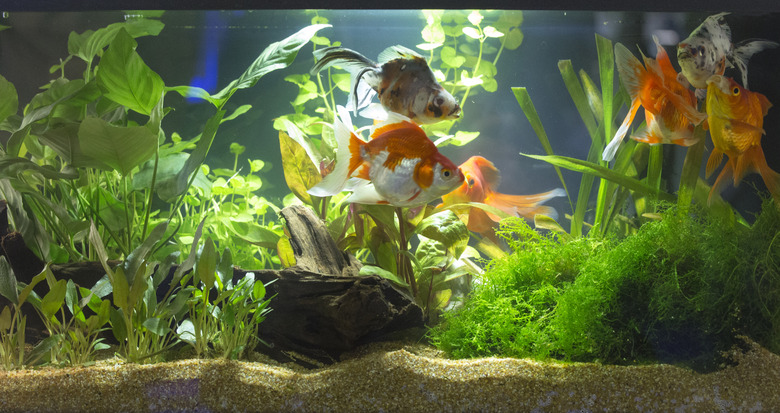How To Raise The Alkalinity In A Freshwater Aquarium
The pH level in a fish tank is one of the many factors you must consider when setting up a home aquarium. While some fish gills aren't suited to water that is highly alkaline, others need at least some alkalinity to thrive. Fortunately, there are easy ways to test, raise and maintain healthy levels of alkalinity in your aquarium.
TL;DR (Too Long; Didn't Read)
Depending on the pH level of your tap water and the level that your fish require, you may need to add a base to your home aquarium to maintain healthy alkaline levels.
Alkaline Levels
Alkaline Levels
A pH level indicates how acidic or basic a solution is on a scale of 0 to 14. Pure water sits in the middle of the scale at 7 and is considered neutral. Any solution above 7 is basic, or alkaline. Anything below 7 is acidic.
Know Your pH
Know Your pH
Before altering the pH of the water in your home aquarium, you must know two pieces of information:
- **Your current pH levels.** If you use city or well tap water, the pH level will vary depending on your location. Usually, it's anywhere from a 6.5 to 7.5. Your local aquarium and hardware stores sell tests that you can use to determine your tank's pH levels. There are different types available. Some digital and chemical test kits tell you other information you need to know about the quality of the water in your tank. You can also get a simple litmus strip test that only tells you the pH level. Several factors can alter the pH level of your tank even over the course of a day, so regularly test the levels to maintain a healthy environment for your fish.
- Which pH level is best for your fish. Typically, the pH level of a freshwater tank should be kept between 6.5 and 7.5, but different fish thrive in different environments. Talk to experts when you buy your fish and determine which levels are best for the ones you add to your aquarium.
Raising Alkalinity
Raising Alkalinity
If you determine that you should raise the alkalinity of your freshwater aquarium, there are a few ways to do so. One route is to purchase powdered alkaline buffers online or at your local pet store. By adding a bit of the buffer to your tank, you can keep water at the pH level you want without disrupting other chemicals in your aquarium or harming the fish. That said, many aquarists recommend removing the fish from the tank temporarily while adding any amendments to the water.
You can also add one of the most common bases, baking soda, to the aquarium. Adding about 1 teaspoon of baking soda per 5 gallons of water to the tank should result in an incremental change that leads to a healthier pH level.
Take care to make changes gradually. A rapid spike in alkalinity can be even more dangerous for a fish than a few more hours in water that is too acidic. Try not to make a change in the pH level greater than 0.3 over a 24-hour period.
With the right knowledge and alkaline buffers, it can be easy to maintain healthy levels of alkalinity that keep the fish in your home aquarium happy and healthy.
Cite This Article
MLA
Dragani, Rachelle. "How To Raise The Alkalinity In A Freshwater Aquarium" sciencing.com, https://www.sciencing.com/raise-alkalinity-freshwater-aquarium-8214550/. 1 May 2018.
APA
Dragani, Rachelle. (2018, May 1). How To Raise The Alkalinity In A Freshwater Aquarium. sciencing.com. Retrieved from https://www.sciencing.com/raise-alkalinity-freshwater-aquarium-8214550/
Chicago
Dragani, Rachelle. How To Raise The Alkalinity In A Freshwater Aquarium last modified March 24, 2022. https://www.sciencing.com/raise-alkalinity-freshwater-aquarium-8214550/
